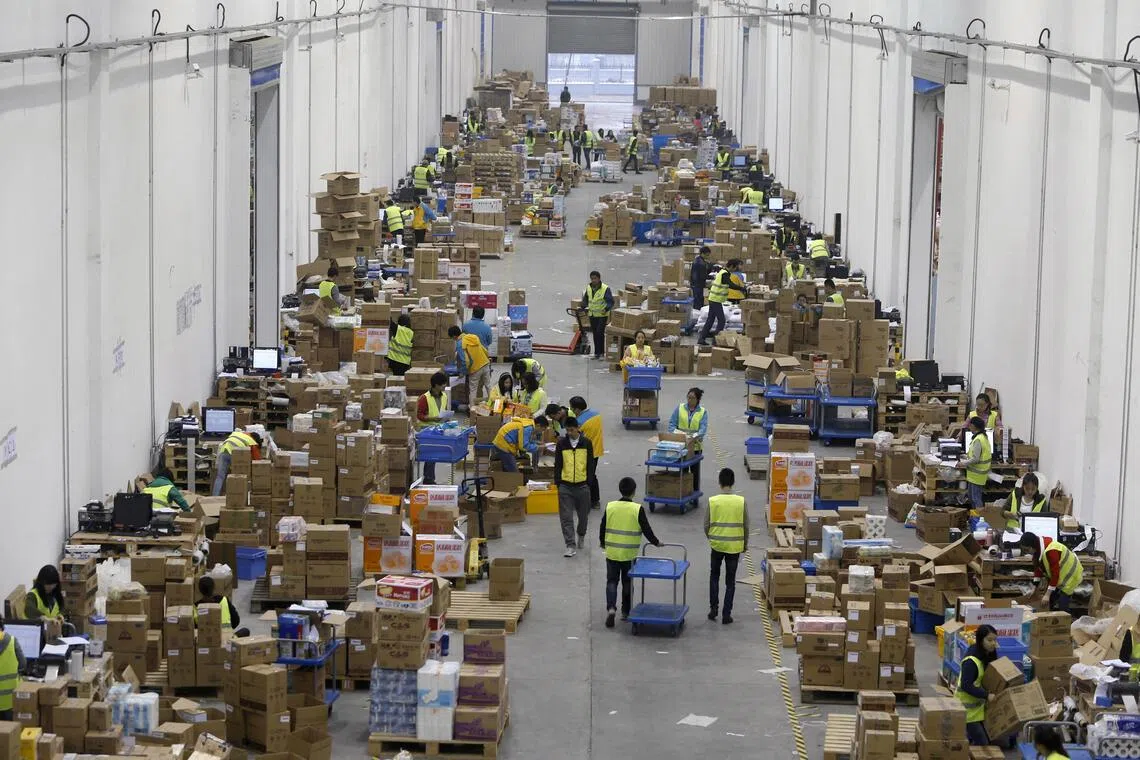Singles Day shopping festival off to great start in China, with AI leading way
Sign up now: Get insights on Asia's fast-moving developments

This year's promotional gala marks a significant milestone for AI in empowering the e-commerce industry, experts said.
PHOTO: REUTERS
BEIJING – The extended Singles Day shopping festival in 2025 saw robust sales during its grand opening on the evening of Oct 20, with major e-commerce platforms ramping up efforts to provide discounts and subsidies, and simplify promotional methods to attract price-conscious consumers.
Experts said China’s biggest online shopping event, the 11-11, or Double Eleven promotional campaign, is expected to witness the accelerated application of artificial intelligence (AI) technology to improve merchants’ operational efficiency and offer personalised guidance.
Data from Tmall, Alibaba Group’s e-commerce platform, showed that in the first hour after the shopping carnival kicked off at 8pm on Oct 20, 80 brands witnessed their sales surpass 100 million yuan (S$18.2 million).
The turnover of more than 30,000 brands doubled year-on-year, while sales of over 18,000 brands exceeded that of the entire day in 2024 within the first hour of the gala.
Mr Liu Bo, president of Tmall, said 2025’s 11-11 event’s role in driving brands’ business growth is irreplaceable. The company is promoting a large-scale deployment of AI on Taobao and Tmall, and integrating large language models into the platforms’ core search and recommendation engines.
Tmall will issue 50 billion yuan worth of shopping coupons and subsidies to shoppers.
According to JD, another major e-commerce player, consumer electronics maintained rapid growth, with AI-related products experiencing a nearly 200 per cent year-on-year increase in sales.
Mr Hong Yong, an associate research fellow at the Chinese Academy of International Trade and Economic Cooperation, said major e-commerce platforms have made promotional methods simpler this time, with direct price cuts being a preferred strategy.
“It is noteworthy that AI technology is deeply reshaping the decision-making process and operational efficiency in the retail sector. For instance, consumers can precisely select products by using AI-powered search tools, while AI will help merchants lower operational costs and improve efficiency in terms of product design, marketing and customer services,” he added.
He said China’s consumption market is poised for steady growth in 2025, with a significant rebound expected in the durable good, electronic device and home appliance sectors fuelled by a trade-in programme and discounts from e-commerce platforms.
Mr Jason Yu, general manager of CTR Market Research, noted that the Singles Day shopping extravaganza has been stretched into a nearly four-week event. He emphasised that the meteoric rise of instant retail, a combination of online shopping and instant delivery, will be a “new battlefield” for industry players.
Alibaba has significant investment in instant retail, with Taobao Instant Commerce participating in the promotional event for the first time.
Senior analyst Mo Daiqing at Internet Economy Institute, a domestic consultancy, said as consumers become more value-conscious and pay more attention to the quality of goods, online retailers should launch new products and upgrade supply chains to attract young shoppers. CHINA DAILY/ASIA NEWS NETWORK


